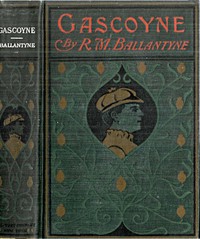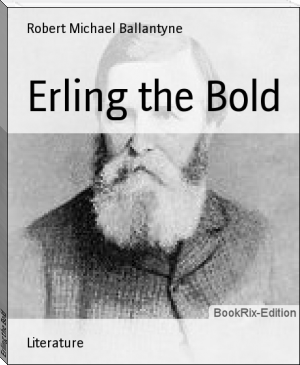Gascoyne, The Sandal-Wood Trader: A Tale of the Pacific by R. M. Ballantyne (classic reads .TXT) 📗

- Author: R. M. Ballantyne
Book online «Gascoyne, The Sandal-Wood Trader: A Tale of the Pacific by R. M. Ballantyne (classic reads .TXT) 📗». Author R. M. Ballantyne
"That he wishes to have done with war," replied the man.
"That is a good wish; but why did the chief begin war?"
"Keona began it!" said the savage, angrily. "We thought our wars with the Christians were going to stop. But Keona is bad. He put the war spirit into my people."
Mr. Mason knew this to be true.
"Then," said he, "Keona deserves punishment."
"Let him die," answered the chief; and an exclamation of assent broke from the other natives. Keona himself, happening to be there, became pale and looked anxious; but remained where he stood, nevertheless, with his arms crossed on his dark breast. A bandage of native cloth was tied round his wounded arm. Without saying a word he undid this, tore it off, and allowed the blood to ooze from the reopened wound.
It was a silent appeal to the feelings and the sense of justice of his comrades, and created a visible impression in his favor.
"That wound was received by one who would have been a murderer!" said Mr. Mason, observing the effect of this action.
"He struck me!" cried Keona, fiercely.
"He struck you in defending his own home against a cowardly attack," answered the missionary.
At this point Ole Thorwald saw fit to interfere. Seeing that the natives were beginning to argue the case, and knowing that no good could come from such a course, he quietly observed:
"There will be neither wife nor child in this place if I do but hold up my hand."
The missionary and his party did not, of course, understand this allusion, but they understood the result; for the savages at once dropped their tones, and the chief sued earnestly for peace.
"Chiefs and warriors," said Mr. Mason, raising his hand impressively, "I am a man of peace, and I serve the Prince of peace. To stop this war is what I desire most earnestly; and I desire above all things that you and I might henceforth live in friendship, serving the same God and Saviour, whose name is Jesus Christ. But your ways are not like our ways. If I leave you now, I fear you will soon find another occasion to renew the war, as you have often done before. I have you in my power now. If you were to fight with us we could easily beat you, because we are stronger in numbers and well armed. Yes, I have you in my power, and, with the blessing of my God, I will keep you in my power forever."
There was a visible fall in the countenances of the savages who regarded this strange announcement as their death-warrant. Some of them even grasped their clubs, and looked fiercely at their enemies: but a glance from Ole Thorwald quieted these restive spirits.
"Now, chiefs and warrior, I have two intentions in regard to you," continued Mr. Mason. "The one is that you shall take your clubs, spears, and other weapons, and lay them in a pile on this mound, after which I will make you march unarmed before us halfway to our settlement. From that point you shall return to your homes. Thus you shall be deprived of the power of treacherously breaking that peace which you know in your hearts you would break if you could.
"My second intention is that the whole of your tribe—men, women, and children—shall now assemble at the foot of this mound and hear what I have got to say to you. The first part of this plan I shall carry out by force, if need be. But for the second part, I must have your own consent. I may not force you to listen if you are not willing to hear."
At the mention of the women and children being required to assemble along with them, the natives pricked up their ears, and, as a matter of course, they willingly agreed to listen to all that the missionary had to say to them.
This being settled, and the natives knowing, from former experience, that the Christians never broke faith with them, they advanced to the mound pointed out and threw down their arms. A strong guard was placed over these; the troops of the settlement were disposed in such a manner as to prevent the possibility of their being recovered, and then the women and children were set free.
It was a noisy and remarkable meeting that which took place between the men and women of the tribe on this occasion; but soon surprise and expectation began to take the place of all other feelings as the strange intentions of the missionary were spoken of, and in a very short time Mr. Mason had a large and most attentive congregation.
Never before had the missionary secured such an opportunity. His eccentric method of obtaining a hearing had succeeded beyond his expectations. With a heart overflowing with gratitude to God, he stood up and began to preach the gospel.
Mr. Mason was not only eccentric, but able and wise. He made the most of his opportunity. He gave them a very long sermon that day; but he knew that the savages were not used to sermons, and that they would not think it long. His text was a double one,—"The soul that sinneth it shall die," and "Believe on the Lord Jesus Christ, and thou shalt be saved."
He preached that day as a man might who speaks to his hearers for the first and last time, and, in telling of the goodness, the mercy, and the love of God, the bitter grief of his own heart was sensibly abated.
After his discourse was over and prayer had been offered up, the savage warriors were silently formed into a band and marched off in front of the Christians to the spot where Mr. Mason had promised to set them free. They showed no disinclination to go. They believed in the good faith of their captors. The missionary had, indeed, got them into his power that day. Some of them he had secured forever.
CHAPTER XIX. SORROW AND SYMPATHY—THE WIDOW BECOMES A PLEADER AND HER SON ENGAGES IN A SINGLE COMBAT.There are times in the life of every one when the heart seems unable to bear the load of sorrow and suffering that is laid upon it,—times when the anguish of the soul is such that the fair world around seems enshrouded with gloom, when the bright sun itself appears to shine in mockery, and when the smitten heart refuses to be comforted.
Such a time was it with poor Frederick Mason when, after his return to Sandy Cove, he stood alone, amid the blackened ruins of his former home, gazing at the spot which he knew, from the charred remnants as well as its position, was the site of the room which had once been occupied by his lost child.
It was night when he stood there. The silence was profound, for the people of the settlement sympathized so deeply with their beloved pastor's grief that even the ordinary hum of life appeared to be hushed, except now and then when a low wail would break out and float away on the night wind. These sounds of woe were full of meaning. They told that there were other mourners there that night,—that the recent battle had not been fought without producing some of the usual bitter fruits of war. Beloved, but dead and mangled forms, lay in more than one hut in Sandy Cove.
Motionless, hopeless, the missionary stood amid the charred beams and ashes, until the words "Call upon me in the day of trouble and I will deliver thee, and thou shalt glorify me," descended on his soul like sunshine upon ice. A suppressed cry burst from his lips, and, falling on his knees, he poured forth his soul in prayer.
While he was yet on his knees, a cry of anguish arose from one of the huts at the foot of the hill. It died away in a low, heart-broken wail. Mr. Mason knew its meaning well. That cry had a special significance to him. It spoke reproachfully. It said, "There is comfort for you, for where life is there is hope; but here there is death."
Again the word of God came to his memory,—"Weep with them that weep." Starting up hastily, the missionary sprang over the black beams, and hurried down the hill, entered the village, and spent the greater part of the remainder of that night in comforting the bereaved and the wounded.
The cause of the pastor's grief was not removed thereby, but the sorrow itself was lightened by sympathy; and when he returned, at a late hour, to his temporary home, hope had begun to arise within his breast.
The widow's cottage afforded him shelter. When he entered it, Henry and his mother were seated near a small table on which supper was spread for their expected guest.
"Tom Armstrong will recover," said the missionary, seating himself opposite the widow, and speaking in a hurried, excited tone. "His wound is a bad one, given by a war-club, but I think it is not dangerous. I wish I could say as much for poor Simon. If he had been attended to sooner he might have lived; but so much blood has been already lost that there is now no hope. Alas for his little boy! He will be an orphan soon. Poor Hardy's wife is distracted with grief. Her young husband's body is so disfigured with cuts and bruises that it is dreadful to look upon; yet she will not leave the room in which it lies, nor cease to embrace and cling to the mangled corpse. Poor, poor Lucy! she will have to be comforted. At present she must be left with God. No human sympathy can avail just now; but she must be comforted when she will permit any one to speak to her. You will go to her to-morrow, Mrs. Stuart, won't you?"
As this was Mr. Mason's first meeting with the widow since the Sunday morning when the village was attacked, his words and manner showed that he dreaded any allusion to his own loss. The widow saw and understood this; but she had consolation for him as well as for others, and would not allow him to have his way.
"But what of Alice?" she said, earnestly. "You do not mention her. Henry has told me all. Have you nothing to say about yourself—about Alice?"
"Oh! what can I say?" cried the pastor, clasping his hands, while a deep sob almost choked him.
"Can you not say that she is in the hands of God—of a loving Father?" said Mrs. Stuart, tenderly.
"Yes, I can say that—I have said that; but—but—"
"I know what you would say," interrupted the widow; "you would tell me that she is in the hands of pirates,—ruthless villains who fear neither God nor man, and that, unless a miracle is wrought in her behalf, nothing can save her—"
"Oh! spare me, Mary; why do you harrow my broken heart with such a picture?" cried Mr. Mason, rising and pacing the room with quick, unsteady steps, while with both hands on his head he seemed to attempt to crush down the thoughts that burned up his brain.
"I speak thus," said the widow, with an earnestness of tone and manner that almost startled her hearers, "because I wish to comfort you. Alice, you tell me, is on board the Foam—"
"On board the pirate schooner!" cried Henry, almost fiercely; for the youth, although as much distressed as Mr. Mason, was not so resigned as he, and his spirit chafed at the thought of having been deceived so terribly by the pirate.
"She is on board the Foam," repeated the widow, in a tone so stern that her hearers looked at her in surprise, "and is therefore in the hands of Gascoyne, who will not injure a hair of her head. I tell you, Mr. Mason, that she is perfectly safe in the hands of Gascoyne."
"Of the pirate Durward!" said Henry, in a deep, angry voice.
"What ground have you for saying so?" asked the widow, quickly. "You only know him as Gascoyne the sandal-wood trader,—the captain of the Foam. He has been suspected, it is true; but suspicion is not proof. His schooner has been fired into by a war-vessel; he has returned the fire: any passionate man might be tempted to do that. His men have carried off some of our dear ones. That was their doing, not his. He knew nothing of it."
"Mother, mother," cried Henry, entreatingly, "don't stand up in that way for a pirate; I can't bear to hear it. Did he not himself describe the pirate schooner's appearance in this room, and when he was attacked by the Talisman did he not show out in his true colors, thereby proving that he is





Comments (0)